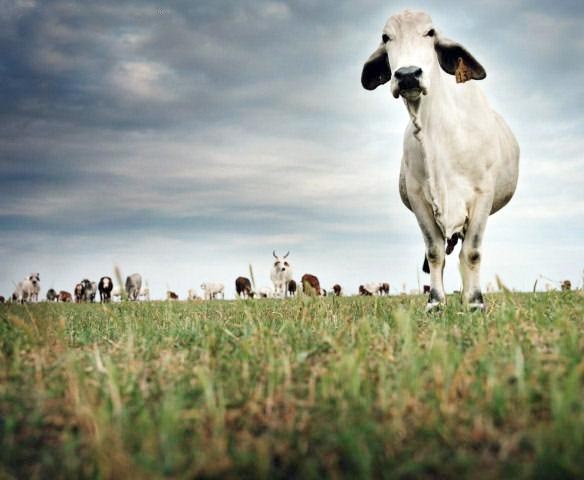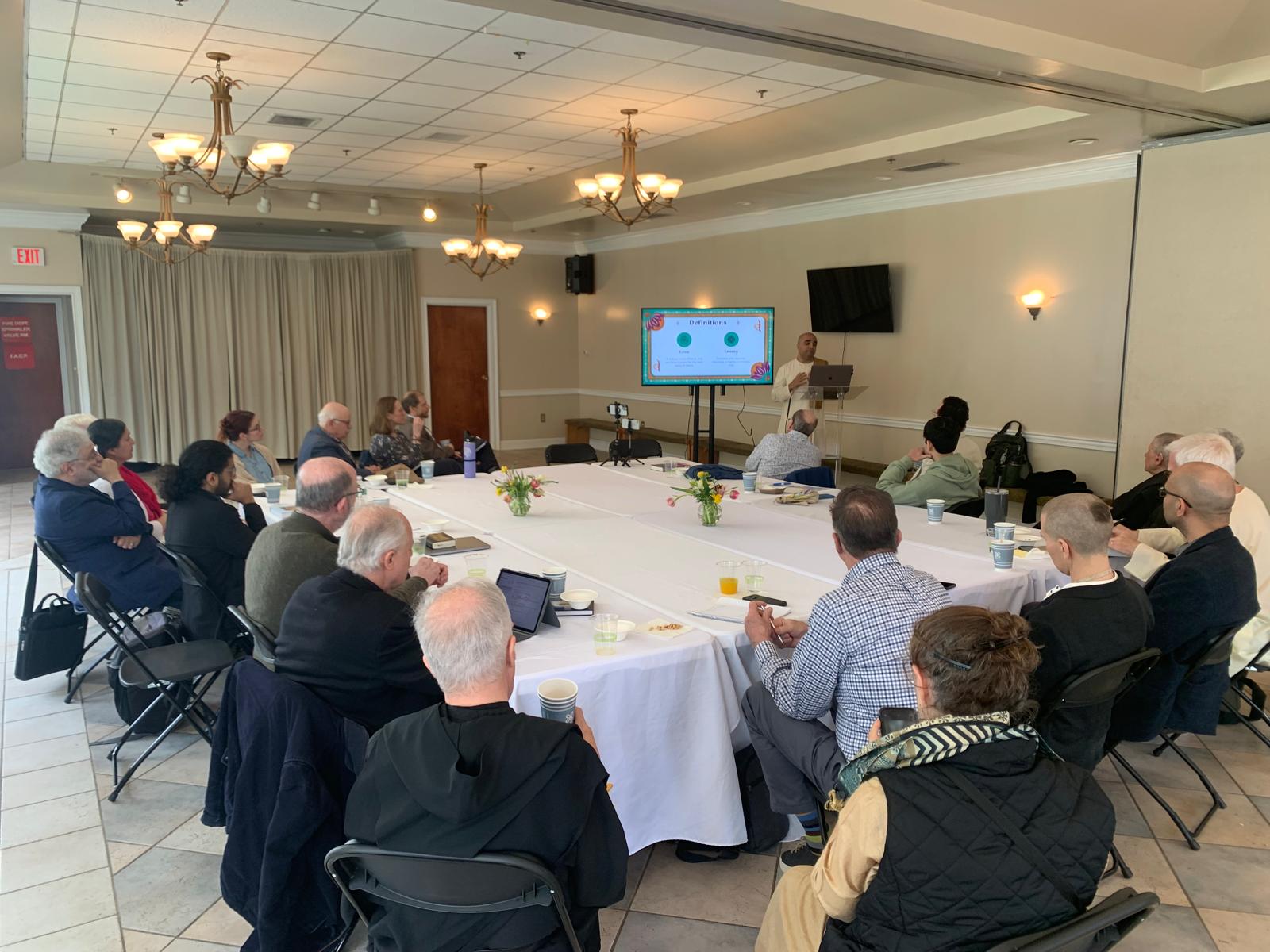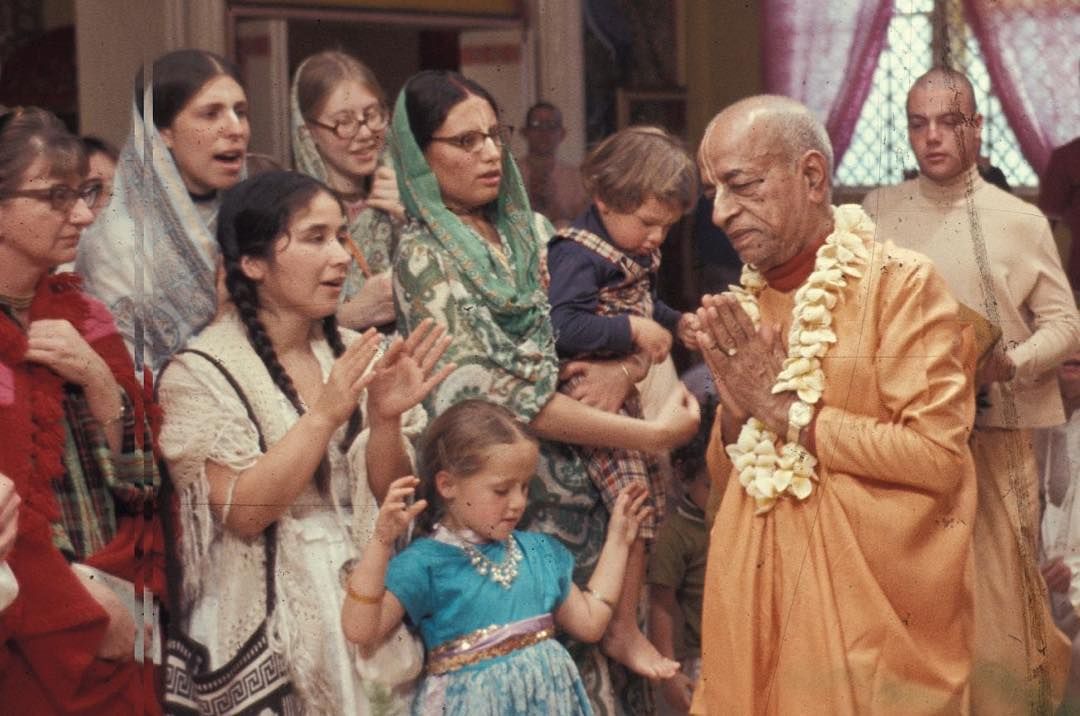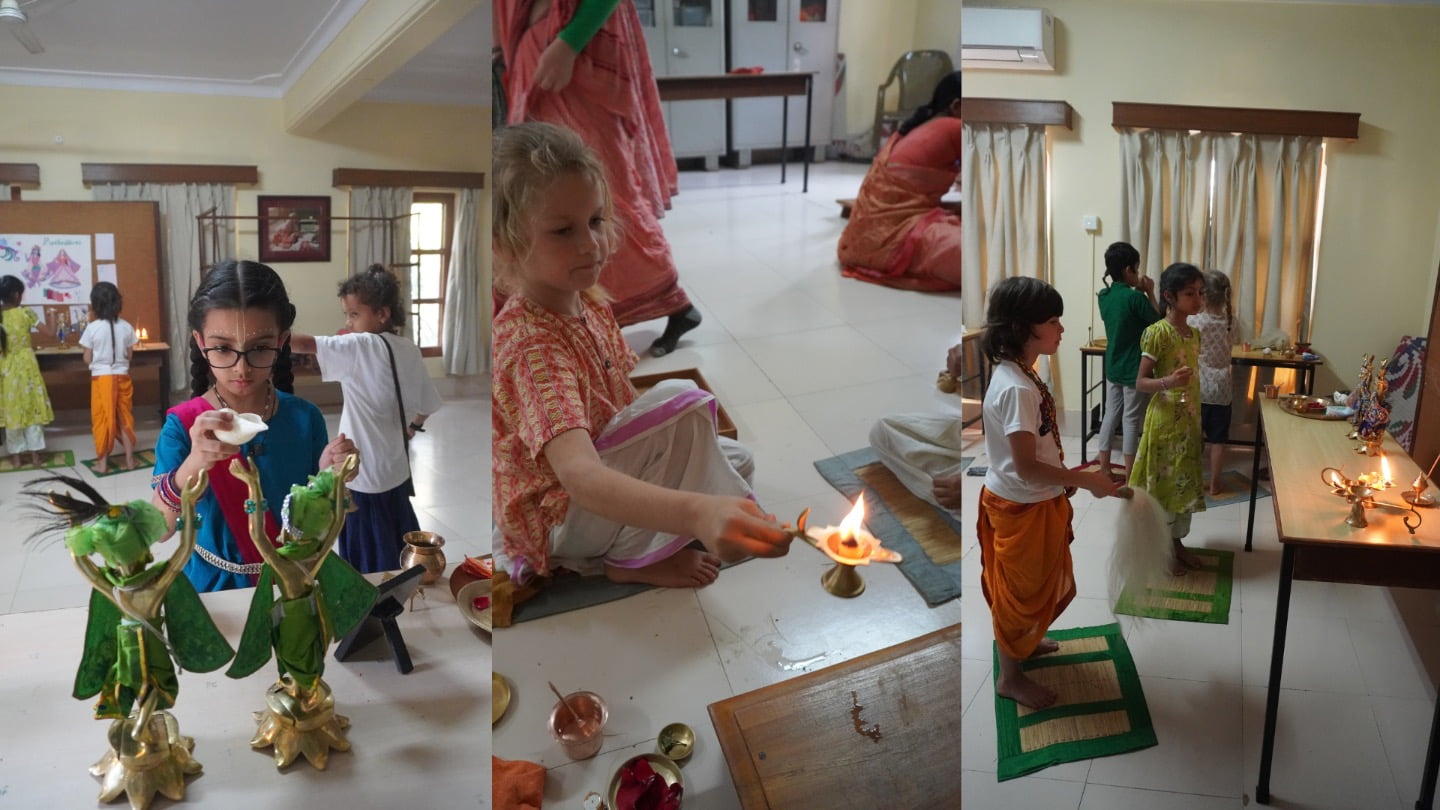The Social Role of Cows
By Hare Krishna Devi Dasi | Май 23, 2009

“In my last birth I was born in the family of cowherd men, and I gave protection to the calves and cows. Because of such pious activities, I have now become the son of a brahmana.” – Lord Chaitanya (Chaitanya-charitamrta, Adi Lila 7.111)
Throughout history many traditional societies have centered on a particular animal, and the relations the people develop with that animal influence the values of the whole society. We think of the role of buffalo in shaping the lives and values of the Native Americans of the Plains. Similarly, we think of the Laplanders and their reindeer, or even the New England whaling villagers and the whales.
In each case, without a particular animal the culture of the people would be entirely different. Because of relations to that animal, whether by shooting, herding, or sailing after it, the society encourages attributes such as toughness, bravery, gentleness, or respect for nature.
Vedic culture centers on the cow. In fact, without cows there can be no true Vedic culture. Veda means “knowledge” – in the highest sense, spiritual knowledge. And as Srila Prabhupada explains, cow protection and brahminical culture are “the two pillars of spiritual advancement.” (Srimad Bhagavatam 1.17.20)
Now, it is easy for even an outsider to understand why brahminical culture is considered indispensable for spiritual advancement. After all, brahmanas are the disseminators of spiritual knowledge and the exemplary maintainers of spiritual standards, just like the priestly class in any society.
But what about cows? What do cows have to do with spiritual advancement? And why cows? Why not sheep or goats or horses?
In his purport to Lord Chaitanya’s statement above, Srila Prabhupada gives us the clue. “The words of Lord Chaitanya Mahaprabhu, the greatest authority, herein clearly indicate that one becomes pious simply by keeping cows and protecting them.” How can that be? One reason is that cows are emblems of the mode of goodness.
In Vedic teachings different animals are associated with different material qualities. For example, monkeys, because of their extraordinary sex drive, belong to the mode of ignorance. Lions are said to be in the mode of passion, and cows in the mode of goodness. When humans ally themselves with an animal in the mode of goodness, they themselves gradually rise to goodness, which is favourable to spiritual advancement.
In the opening quote of this article, Lord Chaitanya was teasing an astrologer who had determined that the Lord, in His past life, had appeared as an incarnation of the Supreme Personality of Godhead. To have some fun with the astrologer, Lord Chaitanya ostensibly denied that He was the Supreme Lord, saying that in His past life He had been merely a cowherd boy, and that only by His pious activities had He now become a brahmana.
Of course, we know that God is never bound by any pious or apparently impious acts. Being the ultimate cause of all karmic reactions, He Himself is transcendental to such cause and effect. Nevertheless, even in His joking words we find important truthful instructions. Human beings can become elevated by taking care of cows (or degraded by slaughtering them.)
If we examine the specific qualities of the brahmanas, persons in the mode of goodness, we can begin to see how those qualities are automatically cultured in a society that relies for its economic base on farming and cow protection. In the Bhagavad-gita (18.42), Krishna lists the qualities of the brahmanas: “Peacefulness, self-control, austerity, purity, tolerance, honesty, knowledge, wisdom, and religiousness.” Let’s look at how a person might develop these qualities by protecting cows.
Brahminical qualities and cow protection
PEACEFULNESS
Almost universally, cows are seen as an emblem of peace. Even the word “bucolic,” referring to a peaceful pastoral scene, comes from the Greek word boukolos, which means “cowherd.” Unlike dogs and cats, cows are generally not inclined to fight one another, even for food. They are sociable and fond of one another and affectionate to their caretakers. Because cows are naturally peaceful, cowherds tend to take on this quality.
Furthermore, one must have a peaceful demeanor for milking cows and training oxen. Cows and bulls are sensitive to human moods. Cows will not give milk if the milker acts upset. Oxen will not learn commands if the trainer is angry. The cowherd has to cultivate peacefulness to get the job done.
SELF-CONTROL
The most important aspect of self-control for one desiring spiritual advancement is control of the tongue. Prabhupada writes, “Only the animal killer [or eater] cannot relish the transcendental message of the Supreme Lord.” (Srimad-Bhagvatam 1.3.24) When by caring for cows a person sees how friendly and loving they are, his compassionate nature is aroused. He can easily give up eating meat, not wanting to kill the animals he loves and depends on.
Eating only food offered to Krishna also promotes control of the tongue. When the cowherd offers Krishna milk products from Krishna’s own cows, and grains and vegetables from His own land, and then takes the remnants in the form of prasadam, the cowherd’s brain becomes spiritually purified, and the words he speaks become sober and happy in glorification of Krishna.
Training oxen is another important aid to sense control. There’s a New England saying that you train the boy by having him train a team of oxen. There’s truth in that. In Sanskrit go means “cow,” and it also means “senses.” A trainer can see that when the oxen (go) do whatever they feel like, they’re useless. Once they’re trained and controlled, they’re useful and happier. The trainer can see that the oxen are proud and happy to work with him when they can control their senses. The comparison with his own senses (go) is automatic. The trainer sees that when he trains and controls his own senses to serve Krishna, he too will be happier and more productive.
AUSTERITY
In a society that truly practices cow protection, the bull is fully used for growing food and transporting it. As a valuable member of society, the ox is carefully maintained and protected from slaughter. Economically, using the ox as the means of transport rules out the pileups of wealth that go with trucking things around with coal, gasoline, and nuclear power. Each farmer can farm only so much land with oxen, much less even than with horses. So the use of oxen regulates the scale of production, which helps guarantee that land and wealth are fairly distributed. There are no 1000-acre agribusinesses. And no heaps of wealth to make it easy for people to become entangled in sense gratification.
Because the work of caring for the cows and the land is satisfying, artificial sources of pleasure are not required. As spiritual life develops, austerity and simple living become a pleasure, not a burden. The tendency will be to use any surplus or any natural opulence for worshipping Krishna, not for sense gratification.
PURITY
Cows can tolerate a wide range of physical conditions. They thrive in the cold Scandinavian countries, in the hot, dry African plains, in the wet tropical jungles of Latin America. But they cannot tolerate filth. They quickly become diseased if not kept clean. As the cowherd works to keep the cows clean, he or she practices living a clean way of life.
TOLERANCE
Probably no other animal is as tolerant as a cow. If by your daily care and affection you convince the cow or ox that you are its well-wisher, it won’t hold a grudge against you for reprimanding it. It won’t attack you. For example, once, by my foolish negligence, one of our milk cows got loose from her stall, and when I walked into the barn I found her eating from a grain cart. I knew she could die from overeating if she didn’t stop. So I yelled at her, but she didn’t stop. I hit her on the back with a stick, but she still kept eating. Finally, I had to hit her in the face, which I hated to do, especially since it was my fault she got loose. But she stopped eating grain and returned to her stall. In five minutes she was mooing softly for me to come and pet her. She wasn’t at all afraid of me, and she wasn’t angry at me. I knew a dog or cat or even a child would never have such tolerance.
If a person can develop tolerance for being corrected, it is a wonderful asset for advancing in spiritual life. Of course, a spiritual master doesn’t beat his disciple with a stick, but sometimes a disciple’s ego gets hurt when his actions or beliefs are shown mistaken. The cowherd can learn tolerance from the cows and oxen.
HONESTY
Cows are straightforward, and their service demands straightforwardness. It’s hard to cheat with them. Either you give them good food, water, and affection or you don’t. Either you are punctual for milkings or you’re not. Either you keep them clean or you don’t. When you make a mistake or get lazy, you’ll probably get a quick reaction. You’re too lazy to clean out the water tank? Milk production will drop because cows don’t want to drink that nasty-tasting water. You forgot about the six o’clock milking? You’ll be kicking yourself tomorrow when you have to take care of a cow suffering from mastitis. You’ll probably never forget again. Cow protection is a practical way of learning to be honest and conscientious.
KNOWLEDGE AND WISDOM
Cultivation of spiritual knowledge starts with a healthy brain. For this, milk is essential. Prabhupada explains, “The body can be maintained by any kind of foodstuff, but cow’s milk is particularly essential for developing the finer tissues of the human brain so that one can understand the intricacies of transcendtal knowledge.” (Srimad-Bhagavatam 3.5.7)
Scientists support this view. They say that Vitamin B12 is essential to maintain healthy nerve cells. (The brain is made up of nerve cells.) A Vitamin-B12 deficiency can take years to manifest, but it is a deadly serious matter, as explained by nutrition expert Laurel Roberts. “The first signs of damage are a characteristic sore back, numbness and tingling in the feet, and diminshed vibration and position sense. Then follow unsteadiness, poor memory, confusion, moodiness, delusions, overt psychosis, and eventually death.”
The only natural source of vitamin B12 in a vegetarian diet is milk. (Obtaining B12 from meat products creates new problems because of the adrenalin and toxins one ingests with the meat.) In a peaceful society, therefore, milk is essential to properly maintain brain cells needed for spiritual intelligence. Prabhupada emphasizes this point:
For such important brain tissues we require a sufficient quantity of milk and milk preparations. Ultimately, we need to protect the cow to derive the highest benefit from this important animal. The protection of cows, therefore, is not merely a religious sentiment but a means to secure the highest benefit for human society. – Light of the Bhagavata
Thus when the cowherd comes home and takes a cup of hot milk at the end of a day of hard work in the fields, he or she is making the brain fit to contemplate spiritual topics. And the peaceful fields and pastures provide the perfect environment to cultivate knowledge and wisdom.
RELIGIOUSNESS
“Milk is liquid religiosity,” says Srila Prabhupada. So what could be more religious than to produce milk and grains to offer to Krishna? Lord Krishna says that a person can understand Him only by devotional service.(Bg. 18.55) And one can perform devotional service by doing one’s daily work as an offering to Krishna. (Bg. 18. 45,46) No need to be a great scholar. No need to be a powerful warrior, or even a highly talented craftsman. If the cowherd faithfully carries out the duties of caring for the cows and bulls and producing food to offer to Krishna, he or she will become spiritually satisfied.
Besides that, just by seeing the cows every day one can easily remember Krishna and His cows in Goloka Vrindavan, in the spiritual sky. That remembrance is the highest religiousness.
Through philosophy and scripture alone a few intelligent people can be motivated to undertake spiritual life. For them to get started on the path back to Godhead may be easy. But most of us are not like that. For us Krishna has very kindly sent the cow and the bull to coach us in developing qualities that will help us in Krishna consciousness.












